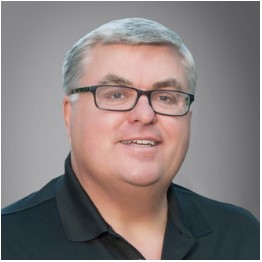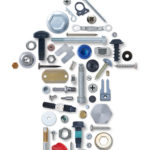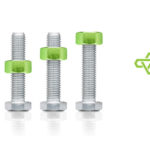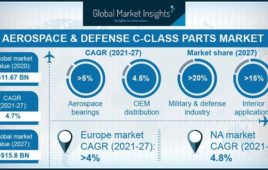
Marc Strandquist
As the COVID-19 pandemic continues, many businesses will need to incorporate updated strategies to remain operational. Optimas Solutions, a global industrial distributor and service provider, has already done just that — it’s developed a renewed approach to manufacturing, supply chain services, and e-commerce.
Optimas is a tech-enabled industrial manufacturer and distributor that delivers fasteners, inventory management, and production-related solutions.
In this interview, the company’s president of the Americas, Marc Strandquist, joins us to explain in more detail. He also shares some of the experiences and lessons the company has learned so far this year, including a few additional measures it’s adopted to stay successful.
Click below to listen to our conversation…
The following is a lightly edited transcript…
Fastener Engineering (FE): Hi, everyone. Thanks for listening. I’m Michelle Froese, an editor with Fastener Engineering. We’ve been reaching out to manufacturers and suppliers that have been deemed essential during the COVID-19 pandemic. As these companies never shut down, we’re asking what experiences and lessons they’ve gained over the last few months and if there are any tips or advice they could share as a result.
To this end, I have Marc Strandquist, President of the Americas with Optimas Solutions, on the line with me. Optimas is a tech-enabled industrial manufacturer and distributor that delivers fasteners, inventory management, and production-related solutions. The company recently rolled out a new strategy for its America’s market because of the pandemic, which I’m sure Marc will share more about during our conversation.
So let’s get to it. Marc, thanks so much for joining me today.
Marc Strandquist (MS): Well, thank you very much. I appreciate the opportunity.
FE: Of course. Can you first please share a little bit about Optimas Solutions and the services you provide?
MS: We’re a global provider of solutions for both distribution, as well as manufacturing. We have manufacturing facilities in Chicago, Illinois, and in England. So, we’re able to provide the OEM customers complete solutions to their needs — whether it’s inventory management programs or whether it’s high-quality blueprint specials that need to be manufactured. We can make proprietary products, cold foreign products, and we’re able to do all that within the scope of our company.
FE: Excellent. When did Optimas get its start?
MS: Well, Optimas is an amalgam of companies from over the years. I mean, we have over 40 years of history. Before Optimas, it was Anixter Fasteners and before that, it was Pentagon, which became a roll-up of different fastener distribution companies. So, we have a long, proud tradition within the fastener industry and distribution that dates back into pre-1970.
FE: Oh, interesting. How has the current pandemic affected business at Optimas and have you remained fully operational during this time?
MS: Yeah, we’re proud to say that all of our locations continue to operate normally and we continue to provide customers the products and services that they require at a very high level. There’s no question in the second quarter of this year — the April, May timeframe —we got hit very hard like everybody else.
In April, it was probably the bottom of the trough. We had over 140 customers that were completely shut down and not taking any products. So, we did not lose any business in terms of the lost customers, but it was just, quite frankly, people weren’t open. But we saw a nice rebound from April to May, and then in June, we saw a tremendous increase of almost 50% that got us to, I’d say currently we’re operating at about 80 to 85% of the pre-COVID economics in terms of consumption and volume.
We’re not quite back to 100% of what we were doing in the first quarter, but we’ve had a nice rebound and we’re in that 85, 90% range.
FE: That’s still quite impressive given the challenges in the last few months. We’ve spoken to a couple of other companies that have remained open during the last little while and they’ve said it’s critical to rethink the way business is done to remain successful. Do you agree, Marc?
MS: Absolutely. And the irony is, I’m currently offsite with our entire operations group — purchasing, demand planning, operations, quality engineering, and everybody that supports the customer outside is sales and marketing. And, we’re actually going through a roadmap of what we think is going to be the long-term solutions to the impact of the virus and what needs to happen.
We’re enhancing in terms of technology and innovation…that’s what we want to be known for. We’re putting an enormous amount of focus into that to be able to provide our customers what they need and do it in this environment. So, an example might be, we have an excellent e-commerce platform that we’re going to be rolling out that we’ve had in place, but only for a small segment of our business. Then how we’re going to roll it out across all elements of our business, the buzz word of the viruses, of course, no touch and no contact.
So, this e-commerce platform is going to give us that opportunity to provide that to customers and enable them to order parts and products off of that.
The second thing that we’re doing is we’re upgrading all our systems in terms of technology. Our manufacturing plants in Chicago, what we’ve just implemented, we took this year to really focus on it with the downtime that we’ve seen because of the virus. And we just implemented a software called Epicor, which is a state-of-the-art technology. We’re doing that on all elements of our business upgrades.
We’re basically using 2020, with all its complications and difficulties, not to sit back in the weeds and see what’s happening, we’re being very aggressive and improving across the board, every element of the business in terms of technology and innovation. And that’s what we want to be known for in the industry. Our brand is going to be an industry leader in terms of these things that will help our customers become more profitable.
FE: Right. In the intro to our conversation, I mentioned the updated strategy that Optimas was launching as a result of the pandemic. And I assume this is part of it. Are there any other features that you can share, Marc?
MS: Yeah, absolutely. Yeah. This is…what I just talked about, is one element of it. But another element of it is in terms of supply chain and strategic sourcing and elements like that. We’ve spent the first six months adding experience. So, we’ve been able to recruit some of the top talents in the industry. And we’re seeing that already bear some fruit where we’ve gotten a lot of experience with people that have gone overseas multiple times.
You have a lot of fastener experience, 20, 25, or 30 years type of experience. And so, we really strengthened the intellectual base of the company in terms of our industry compared to where it was a year ago. So, when you combine that kind of talent and experience with improved technology and innovative systems, we’re going to be a very powerful force out there in the industry.
FE: It’ll be exciting to see. Earlier, you mentioned the e-commerce aspect. Is this going to include updates to your website or what will that entail exactly?
MS: Well, it’s going to be a platform for customers to order from. So, you can use the example of Amazon, Cabela’s, or Bass Pro Shop where you get online to the webpage and there’ll be multiple directions you can take. You can click on fasteners, you can click on personal protective equipment, like PPE and safety equipment. We want them to be where they need to be in three clicks and be in the position where they can order. And we have a shopping basket, just like any other commercial website that’s out there so they can sit there and order as much as they want, put it into the shopping cart and then place the order.
The web page (and I separate the two) that we’ll have is a traditional webpage that’s a marketing opportunity for people to look at our business, understand what we can offer, all the different variations of it that we could provide. In terms of technology, we have the latest technology we can give a customer in terms of RFID. And many of the other types of technology-driven systems, as opposed to just two boxes of parts up in Iraq, we can give them a much more sophisticated system.
The webpage will convey those types of pieces of information, but the e-commerce website will actually give them an activity that they can have themselves 24 hours a day, seven days a week, where they can place an order and pick out the parts that they require.
FE: Thanks for sharing, Marc! What types of modifications have you had to make in your facilities or with staff to cope with the restrictions that are, or that have been in place due to COVID-19?
MS: Well, one example would be people working from home, where we had a traditional office at our headquarters in Glenview. And, during the COVID time period that was shut down and people worked from home. That’s one example.
Of course the other is as people, as we open back up again, having people at the door where we check temperatures and asked all the normal questions about whether or not… how someone’s feeling, did they travel out of the country, etc. We’ve put in the appropriate controls for that.
Those are just two examples of things that we’ve been doing to accommodate this and I’m very proud of our workforce. They adapted very readily to all this, and we really didn’t miss a beat in terms of satisfying our customer demands. And even though they were working from home versus being in an office, the team rose to the occasion and performed very, very well.
FE: How have you been able to maintain positivity, particularly amongst your staff during the last few months?
MS: Well…communication. Trying to be as transparent and open as possible. Letting people know exactly what’s going on. We’ve tried to do simple things like weekly trivia contests where we have people provide answers to a list of trivia questions and they might get a PTO day for the winter.
Yeah, we try and do local facilities-type of activities. The one example would be our manufacturing plant in Wooddale, as a reward to the people we had everybody dressed up in their favorite baseball team and then we had an outdoor barbecue. Employees got to come out and get a free, hot lunch and spend some time together, honoring social distancing and all that. But we try not to have it impact our culture and in terms of trying to reward people and to recognize milestones and to celebrate achievement.
It does make it a little more difficult, but we just have to find clever ways of getting around it and staying true to our culture and what we want to be.
FE: A great way to remain connected! What are your thoughts about the future of fasteners? Do you remain hopeful or what do you foresee perhaps for next year or the next couple of years?
MS: I think the question is really, “What do I think about the economy?” I mean, fasteners are going to be around until you and I are long retired. People are going to need fasteners to put things together. I mean, that is just never going to stop. They’re never going to be able to invent a glue that’s fancy enough that you can put the glue on and put a joint together, but then you got to take it apart and do maintenance. Whether it’s engines or other things that you just are going to have to assemble and disassemble and that.
So, in terms of fasteners, they’re going to be around. I’m not too worried about that. But the economy is such that I think each company has got to develop what its true value proposition is and get out there in the marketplace. And as I coach our people, I really don’t want to hear about the impact of the virus or a bad economy.
I think what’s important is we make our own economy. And, I think that’s what’s going to differentiate us from in the marketplaces. We’re going to get out there, sell our added value type of products and services that we offer and we’re going to make our own economy and we’re not going to let these other things be an obstacle to us in terms of a mental outlook of how we want to handle things. We’re going to be very positive and we’re going to go after the marketplace and we’re going to compete.
FE: Excellent. As an essential distributor and a manufacturer, what final words of wisdom can you share with others in the fastening industry that are just getting back to business now?
MS: I think the key is communication at all three levels. Make sure you have frequent communication with your employees and make sure they know what’s going on in this time period, that there could be some people that are worried about the future and stability.
You’ve also got to communicate with your suppliers and make sure they know what’s going on within your company and make sure those lines of communication are wide open and frequent.
And then, of course, the most important is the people that pay the bills, which are our customers. Frequent communication with your customers at all levels to make sure they know what’s going on and they have a sense of security because obviously this has impacted a lot of companies and where we’ve survived the process and are coming out stronger than when we went into this virus, a time where we’re going to be a stronger, more robust company. And we’re going to be able to offer more products and services.
There’s going to be other suppliers that aren’t going to make it still and they’re going to have deep financial troubles. And so our customer base has a lot of worries about the supply chain and our goal is to make sure they know that we’re not anybody they need to worry about. In fact, we’re bigger and better, and we can offer more products to secure their supply chain and give them the security they need going forward, that they can make whatever products that they’re making as an OEM.
FE: Thanks, Marc. If listeners would like to learn more about Optimas Solutions, where can they go?
MS: They can go to our website. We have a tool there that they can ask someone to follow up with them on. We can send a salesperson out there to review stuff. We can do it by Zoom or a team meeting. That’s part of our thing that we’re adapting to is it’s not always direct selling face to face anymore. Many of our customers are still working out of their homes and some aren’t going to be going back until the first of the year. We can have contact that way and we’ll be very prompt and responding, answering any questions that someone may have.
FE: Sounds great! We’ll be sure to link to your website in the show notes for this interview. I really appreciate your time today, Marc. And thanks also to everyone else for listening. This is Michelle Froese with Fastener Engineering.







Tell Us What You Think!